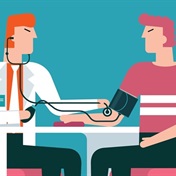How many people know their blood pressure reading? In the fast-paced society in which we live, stress and tension have become part of our daily lives and monitoring our blood pressure is just not a priority. This lack of awareness can lead to hypertension and a host of potential medical conditions.
Often termed "the silent killer" owing to a lack of identifiable symptoms, hypertension – the medical term for high blood pressure - is a leading cause of heart attacks, strokes, kidney failure and premature death worldwide. Up to two thirds of sufferers are unaware of the condition and furthermore it is estimated that 1 in 4 South Africans between 15 and 64 is a sufferer.
What causes hypertension?
High blood pressure develops when the walls of the blood vessels lose their natural elasticity. They become rigid and narrower. The pressure on these walls consequently increases and high blood pressure develops.
So what should you look out for?
There are rarely any visible symptoms, only in most extreme cases (hypertensive crisis) sufferers may or may not experience: severe headache, nosebleeds, shortness of breath and severe anxiety.
What is normal blood pressure?
Your blood pressure should ideally be 120/80 mmHg or less and a high to normal reading should not be above 139/89 mmHg. If your blood pressure reading is consistently higher than140/90 mmHg, you should seek advice from a medical professional.
Director of Nutrition and Education and Registered Dietician at the Heart and Stroke Foundation SA (HSFSA), Shân Biesman-Simons comments: "Everyone should be tested regularly, precisely because hypertension often has no symptoms until it is too late. Once diagnosed, hypertension sufferers need to take their blood pressure medication exactly as prescribed by their doctor. Remember: your health is your responsibility."
Are you a likely candidate for high blood pressure?
These are some factors that can increase your risk of developing high blood pressure and thus your risk for heart attack, heart disease and stroke:
- A family history of high blood pressure
- Ethnicity eg. the black African population has a greater predisposition to hypertension
- Age: the risk of developing high blood pressure increases with age
- Being overweight (especially around the stomach area) contributes to a 2-6 times higher risk!
- An unhealthy diet, especially one that includes a too much salt
- Excessive alcohol consumption
- Physical inactivity
- Smoking
- Stress
- Pregnancy
- Certain medications like birth control pills, steroids and anti-inflammatory drugs
- Severe kidney disease
Addressing high blood pressure is crucial, as it can lead to a heart attack or stroke, kidney failure or sight impairment such as glaucoma or even blindness. Tiredness, shortness of breath and swollen ankles are also often experienced. Moreover, the increased strain on your heart can also weaken this vital organ, make it less efficient and eventually lead to heart failure.
The HSFSA has the following recommendations for a lower blood pressure and healthy lifestyle:
- Get tested! The HSFSA recommends getting your blood pressure tested at least once a year, and more often if you have a family history of hypertension
- Eat small, regular meals every day
- Eat a healthy, balanced diet
- Enjoy a variety of fruits and vegetables (at least 5 servings a day)
- Avoid fatty foods, especially those that are high in saturated fats (e.g. full cream dairy products, meat, chicken skin and fried foods)
- Eat foods that are high in fibre and whole grains (limit refined foods and drinks high in added sugars)
- Choose Heart Mark products when shopping or eating out as these are healthier alternatives – visit www.heartmark.co.za for a list of products endorsed by the Heart and Stroke Foundation SA
- Overweight people are advised to lose weight. Losing as little as 5-10% of your total body weight can lead to a meaningful drop in blood pressure
- Limit total salt (sodium chloride) intake. This not only includes table salt but also salt that is hidden in processed and packaged foods. We recommend no more than 5 g (1 teaspoon) of salt per day
- If you drink alcohol, do so in moderation. Limit daily intake to 1 drink per day in women and 2 drinks per day in men
- Include regular physical activity as part of your daily routine (aim for at least 30 minutes of moderate intensity exercise 5 times a week)
Biesman-Simons concludes, ‘This is definitely an area where knowledge is power. Hypertension can be treated, but first it needs to be identified. World Hypertension Day is on 17 May and the HSFSA is driving home the message that awareness is the key to managing this life-threatening condition. Know your number, know your risk!’
As a service to the community, the Heart and Stroke Foundation South Africa offers free blood pressure screenings to public organisations. Please contact Amina on amina@heartfoundation.co.za or 021 403 6450 to arrange a screening. You can also contact a dietician on the Heart Mark Diet Line on 0860 223 222 for free nutritional advice.
Heart and Stroke Foundation of South Africa (HSFSA) press release
(Health24, May 2011)
Read more:
Hypertension on increase in South Africa
Health24's Hypertension Centre
Hypertension: effects on the body




 Publications
Publications
 Partners
Partners














